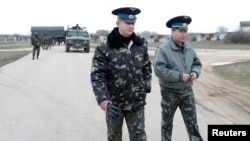Crimea is a strategically located region on the Black Sea with a complicated history.
Crimea is a peninsula on the northern coast of the Black Sea and an autonomous, predominantly Russian-speaking, republic of Ukraine.
Ethnic Russians account for 58 percent of Crimea's population, while Ukrainians make up 24 percent. Crimean Tatars, who began returning to the peninsula from exile after the fall of the Soviet Union, comprise 12 percent of its population.
In its early history, the Crimea was part of several major empires. By the 13th century, it was occupied by the Tatars - Turkic-speaking Muslims who were part of the Mongol Empire.
The Crimea was annexed by Russian empress Catherine the Great in 1783.
The Crimean War of 1853-56 pitted Russia against Great Britain and France.
Allied forces took the city of Sevastopol, the home of the Tsar’s Black Sea Fleet, after a long siege. By the war’s end, the Crimea lay in ruins.
Crimea was the sight of brutal fighting during the 1917 Russian revolution and during World War II. During this time, Crimea was part of the Russian Soviet Federative Socialist Republic.
In 1944, Soviet dictator Josef Stalin deported the entire Crimean Tatar population to Central Asia and other parts of the Soviet Union for their alleged collaboration with the Nazis.
In 1954, the Soviet Union, now under the leadership of Nikita Khrushchev, transferred Crimea from the Russian Soviet Federative Socialist Republic to the Ukrainian Soviet Socialist Republic.
After the fall of the Soviet Union in 1991, Crimea became part of independent Ukraine, and Moscow and Kyiv agreed to divide up the former Soviet Black Sea Fleet.
In a recent poll of Russians by the state-run All-Russia Center for the Study of Public Opinion, 56 percent of the respondents said they saw Crimea as part of Russia.
Crimea is a peninsula on the northern coast of the Black Sea and an autonomous, predominantly Russian-speaking, republic of Ukraine.
Ethnic Russians account for 58 percent of Crimea's population, while Ukrainians make up 24 percent. Crimean Tatars, who began returning to the peninsula from exile after the fall of the Soviet Union, comprise 12 percent of its population.
In its early history, the Crimea was part of several major empires. By the 13th century, it was occupied by the Tatars - Turkic-speaking Muslims who were part of the Mongol Empire.
The Crimea was annexed by Russian empress Catherine the Great in 1783.
The Crimean War of 1853-56 pitted Russia against Great Britain and France.
Allied forces took the city of Sevastopol, the home of the Tsar’s Black Sea Fleet, after a long siege. By the war’s end, the Crimea lay in ruins.
Crimea was the sight of brutal fighting during the 1917 Russian revolution and during World War II. During this time, Crimea was part of the Russian Soviet Federative Socialist Republic.
In 1944, Soviet dictator Josef Stalin deported the entire Crimean Tatar population to Central Asia and other parts of the Soviet Union for their alleged collaboration with the Nazis.
In 1954, the Soviet Union, now under the leadership of Nikita Khrushchev, transferred Crimea from the Russian Soviet Federative Socialist Republic to the Ukrainian Soviet Socialist Republic.
After the fall of the Soviet Union in 1991, Crimea became part of independent Ukraine, and Moscow and Kyiv agreed to divide up the former Soviet Black Sea Fleet.
In a recent poll of Russians by the state-run All-Russia Center for the Study of Public Opinion, 56 percent of the respondents said they saw Crimea as part of Russia.




